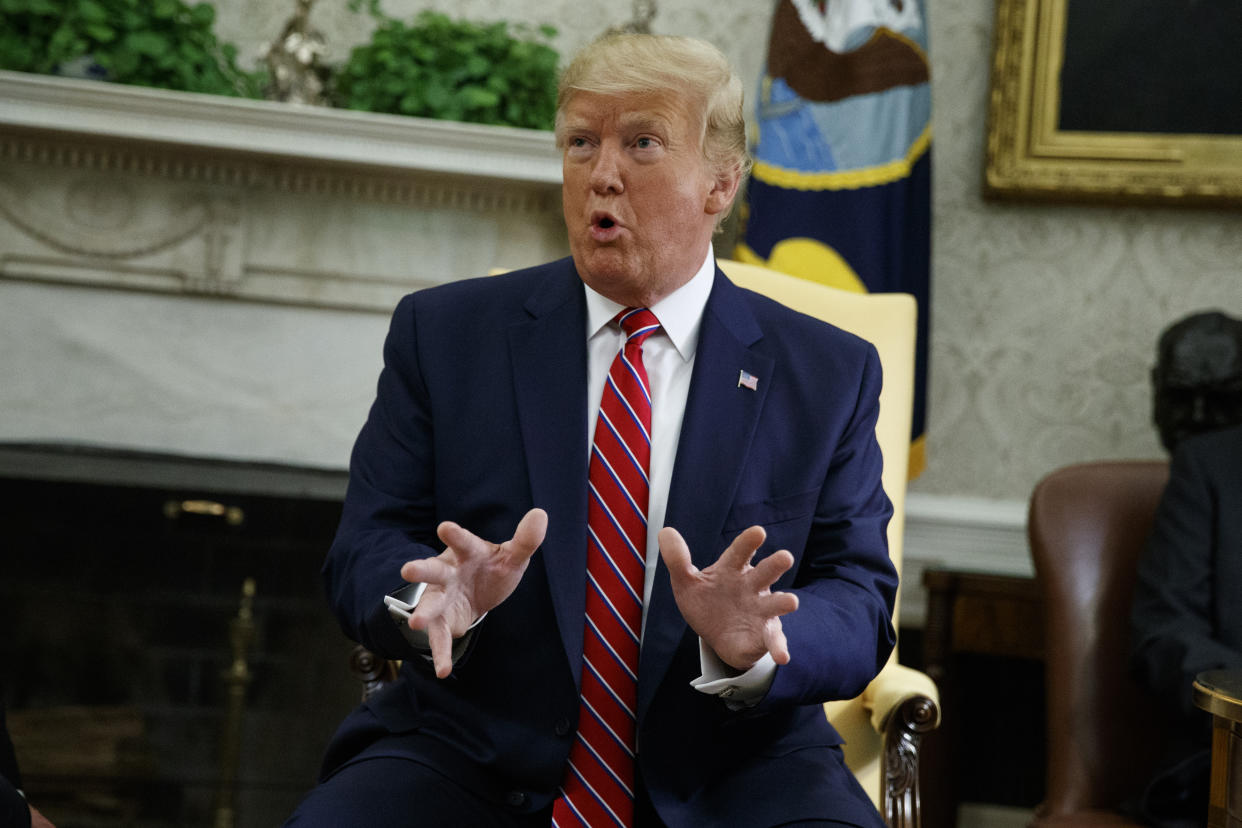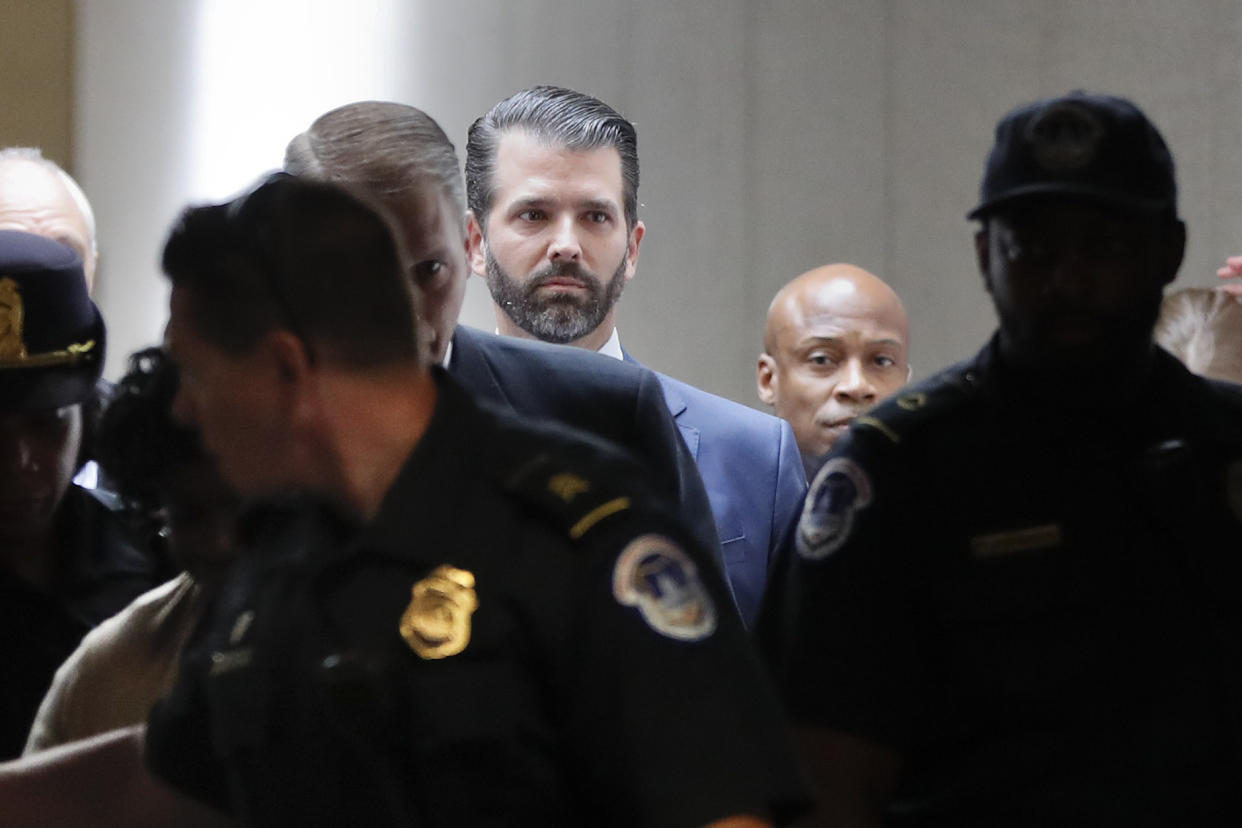Trump defends position on 'oppo research' from foreign governments: 'How ridiculous' to tell the FBI
President Trump on Thursday attempted to defend his stunning admission that he would accept damaging information against his political rivals from foreign governments without necessarily alerting the FBI.
“I meet and talk to ‘foreign governments’ every day,” Trump tweeted, before ticking off a list of foreign dignitaries he met with on a recent trip to Europe. “I just met with the Queen of England (U.K.), the Prince of Whales, the P.M. of the United Kingdom, the P.M. of Ireland, the President of France and the President of Poland. We talked about ‘Everything!’”
In his tweet, the president misspelled Wales. He corrected it in a later post.
“Should I immediately call the FBI about these calls and meetings? How ridiculous!” he continued. “I would never be trusted again.”
Discussions between the president and foreign leaders are ordinarily kept secret, but in most cases — except in Trump’s meetings with Russian President Vladimir Putin — there are note-takers and other officials present.
In an Oval Office interview on Wednesday, Trump was asked by ABC’s George Stephanopoulos what he would do if foreign governments offered him damaging information in the upcoming presidential race.
“They have information — I think I’d take it,” Trump said. “If I thought there was something wrong, I’d go maybe to the FBI — if I thought there was something wrong. But when somebody comes up with oppo research, right, they come up with oppo research, ‘Oh let’s call the FBI.’ The FBI doesn’t have enough agents to take care of it.”
Trump also claimed without evidence that receiving such information from foreign governments is common in Congress.
EXCLUSIVE: Pres. Trump tells @GStephanopoulos he wouldn't necessarily alert the FBI if approached by foreign figures with information on his 2020 opponent: "It’s not an interference. They have information. I think I’d take it." https://t.co/yWRxMOaFqW pic.twitter.com/qwLw53s5yc
— ABC News (@ABC) June 12, 2019
“When you go and talk, honestly, to congressmen, they all do it, they always have, and that’s the way it is,” the president said. “It’s called oppo research.”
Opposition (or “oppo”) research in American elections usually involves public sources of information, such as newspaper articles. Getting secret information from a foreign government could leave the recipient open to blackmail or create an obligation for an official to act in that government’s interest.
In his Thursday tweets, Trump cited unverified reports that Democratic lawmakers, including Sen. Mark Warner, D-Va., and Rep. Adam Schiff, D-Calif., took information from foreign sources in their investigations into his 2016 campaign. (In 2017, Schiff was the target of an apparent prank by Russian comedians.)
Warner and Schiff were the ranking members of their respective intelligence committees and looking into foreign meddling as part of their official duties. They were not engaged in a political campaign at the time.
Speaking to reporters on Capitol Hill Thursday, Warner blasted Trump for his apparent willingness to accept dirt from an adversary.
“The fact that this president has so little moral compass or the understanding of the need to protect our nation that he says he’d still welcome information from Russia, China or any other potential adversary if it helps his political campaign is outrageous,” Warner said.
Both Warner and House Speaker Nancy Pelosi said they each would put forth legislation mandating that campaigns report foreign offers of assistance.
“I mean, it’s so self-evident as a matter of ethics, but we'll have to codify it,” Pelosi said. “There is a sense of decency.
“What the president said last night shows clearly once again, over and over again, that he does not know the difference between right and wrong,” she added. “And that’s probably the nicest thing I can say about him.”

Republican Sen. Lindsey Graham said it was a “mistake” for Trump to say he'd consider accepting foreign dirt.
“If a foreign government comes to you as a public official and offers to help your campaign giving you anything of value be it money or information on your opponent, the right answer is no,” Graham said.
House minority leader Kevin McCarthy dismissed Trump’s comments.
“I’ve watched this president. I’ve listened to this president,” McCarthy said. “He does not want foreign governments interfering in our election and he has been very strong on that.”
Both Graham and McCarthy quickly pivoted to the Democratic National Committee’s hiring of former British spy Christopher Steele, who in 2016 produced a dossier with salacious, unverified claims against Trump. Steele, though, was private citizen at the time and not working for a foreign government,
Trump’s comments to Stephanopoulos came the same day his eldest son, Donald Trump Jr., met with lawmakers for a second time about the infamous June 2016 Trump Tower meeting he arranged with a Russian lawyer who claimed to have dirt on Clinton. Trump Jr. did not alert the FBI.

“Somebody comes up and says, ‘Hey, I have information on your opponent,’ do you call the FBI?” Trump said. “I’ll tell you what, I’ve seen a lot of things over my life. I don’t think in my whole life I’ve ever called the FBI. In my whole life. You don’t call the FBI. You throw somebody out of your office, you do whatever you do. ... Oh, give me a break — life doesn’t work that way.”
Stephanopoulos reminded Trump that FBI Director Christopher Wray testified in May that the bureau “would want to know about” foreign governments offering dirt on U.S. politicians.
“The FBI director is wrong, because frankly it doesn’t happen like that in life,” Trump said. “Now maybe it will start happening, maybe today you’d think differently.”
_____
Read more from Yahoo News:

